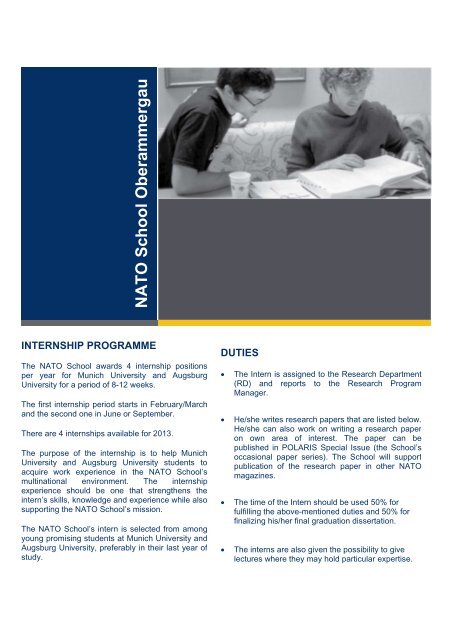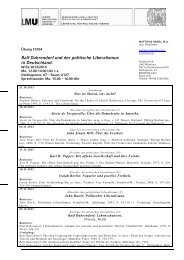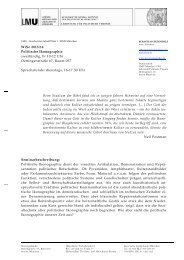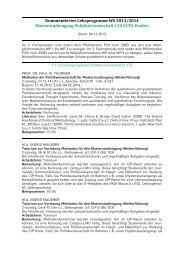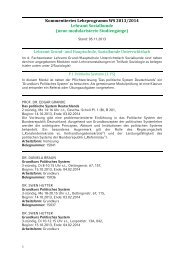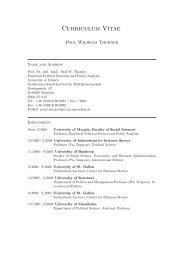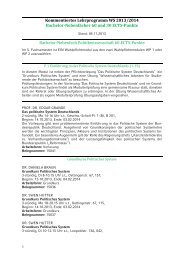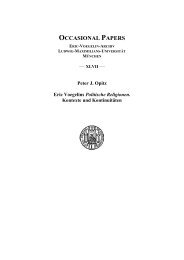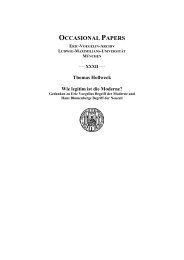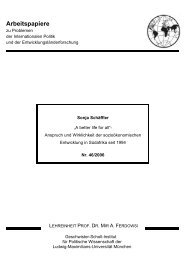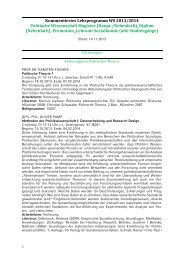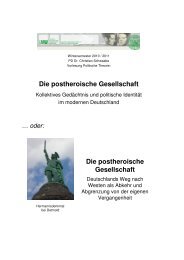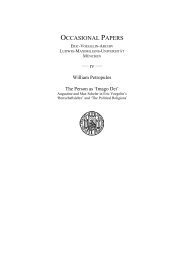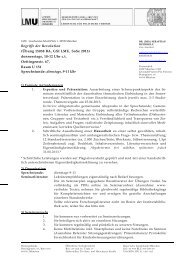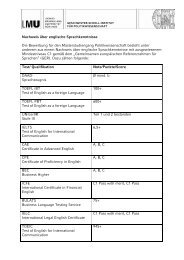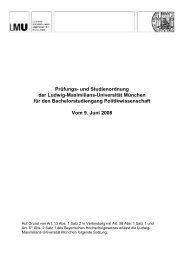NATO School Oberammergau - Geschwister-Scholl-Institut für ...
NATO School Oberammergau - Geschwister-Scholl-Institut für ...
NATO School Oberammergau - Geschwister-Scholl-Institut für ...
Create successful ePaper yourself
Turn your PDF publications into a flip-book with our unique Google optimized e-Paper software.
<strong>NATO</strong> <strong>School</strong> <strong>Oberammergau</strong><br />
INTERNSHIP PROGRAMME<br />
The <strong>NATO</strong> <strong>School</strong> awards 4 internship positions<br />
per year for Munich University and Augsburg<br />
University for a period of 8-12 weeks.<br />
The first internship period starts in February/March<br />
and the second one in June or September.<br />
There are 4 internships available for 2013.<br />
The purpose of the internship is to help Munich<br />
University and Augsburg University students to<br />
acquire work experience in the <strong>NATO</strong> <strong>School</strong>’s<br />
multinational environment. The internship<br />
experience should be one that strengthens the<br />
intern’s skills, knowledge and experience while also<br />
supporting the <strong>NATO</strong> <strong>School</strong>’s mission.<br />
The <strong>NATO</strong> <strong>School</strong>’s intern is selected from among<br />
young promising students at Munich University and<br />
Augsburg University, preferably in their last year of<br />
study.<br />
DUTIES<br />
<br />
<br />
<br />
<br />
The Intern is assigned to the Research Department<br />
(RD) and reports to the Research Program<br />
Manager.<br />
He/she writes research papers that are listed below.<br />
He/she can also work on writing a research paper<br />
on own area of interest. The paper can be<br />
published in POLARIS Special Issue (the <strong>School</strong>’s<br />
occasional paper series). The <strong>School</strong> will support<br />
publication of the research paper in other <strong>NATO</strong><br />
magazines.<br />
The time of the Intern should be used 50% for<br />
fulfilling the above-mentioned duties and 50% for<br />
finalizing his/her final graduation dissertation.<br />
The interns are also given the possibility to give<br />
lectures where they may hold particular expertise.
DUTIES<br />
<br />
<br />
He/She also provides support for conferences,<br />
seminars, working groups, when required by the<br />
Research Program Manager.<br />
The incumbent of the post may be required to<br />
perform other related duties as directed by the<br />
Research Program Manager.<br />
QUALIFICATIONS<br />
Education:<br />
In order to be eligible for a <strong>NATO</strong> <strong>School</strong>’s Internship<br />
individuals should be students at Munich University or<br />
Augsburg University in their last year, in Economics or<br />
Political Science, Social Sciences, International<br />
Relations, Law or another relevant field.<br />
Professional:<br />
Candidates should be fluent in oral and written English.<br />
Knowledge of other European languages is a further<br />
asset.<br />
Interns also need to know how to use e-mail, internet<br />
browsers, and should have a good knowledge of<br />
Microsoft XP (Word, Power Point, and Excel).<br />
SELECTION PROCEDURE<br />
Applicants should forward their letter of application<br />
stating their motivation, area of interest and<br />
competence.<br />
A copy of their resume, a course list and relevant<br />
documents should be sent to Dr. Tanja Zinterer, who<br />
will suggest applicants to the <strong>NATO</strong> <strong>School</strong>.<br />
Please do not send original documents.<br />
All d t h ld b b itt d i E li h<br />
Topics of interest:<br />
In 2013 the <strong>NATO</strong> <strong>School</strong> is looking forward for interns<br />
with interest in developing the following topics:<br />
<br />
Implications of <strong>NATO</strong> Chicago Summit 2012 for<br />
Education and Training ( a written paper and<br />
brief to the <strong>NATO</strong> <strong>School</strong> Curriculum Review<br />
Board)<br />
<br />
<strong>NATO</strong> Response Force in the Strategic Context<br />
<strong>NATO</strong> Forces 2020 and Smart Defence –<br />
Opportunity for a New Culture of Cooperation<br />
<strong>NATO</strong> in the Arctic: Challenges and<br />
Opportunities<br />
Send your complete application<br />
package via post or email to:<br />
Dr. Tanja Zinterer<br />
<br />
Piracy – Impact on Global Economy<br />
<strong>Geschwister</strong>-<strong>Scholl</strong>-<strong>Institut</strong><br />
Connected Forces Initiative – Impact on<br />
Education and Exercise Activities<br />
The impact of kinetic and non-kinetic targeting<br />
operations in Afghanistan and the impact it has<br />
caused<br />
Read ahead packages will be provided to the<br />
interns prior to their arrival at the <strong>NATO</strong> <strong>School</strong>.<br />
LMU München<br />
Oettingenstrasse 67<br />
80538 München<br />
Zinterer@gsi.uni-muenchen.de<br />
2
CONDITIONS<br />
Job-Related:<br />
<strong>NATO</strong> <strong>School</strong> will offer interns free accommodation in<br />
the Bundeswehr Kaserne, and a meal card usable at<br />
the German military dining facility, with maximum<br />
value of 50 EURO/week.<br />
Interns are responsible for travel costs as well as<br />
medical insurance, which must be valid in Germany. A<br />
letter of good conduct and a basic health insurance<br />
policy for the duration of the internship are also<br />
required.<br />
The average working load for intern at the <strong>School</strong> is<br />
36 hours a week. The interns can attend selected<br />
courses given at the <strong>NATO</strong> <strong>School</strong> without any costs.<br />
Interns will have the opportunity to take advantage of<br />
access to visiting speakers, students, and <strong>NATO</strong><br />
<strong>School</strong> staff in furtherance of their research work.<br />
These people are the <strong>School</strong>’s greatest resource, and<br />
come from various military structures, international<br />
organizations, and academia.<br />
In addition, interns will have access to the George C.<br />
Marshall Center’s award-winning research library in<br />
Garmisch-Partenkirchen.<br />
Social:<br />
The <strong>NATO</strong> <strong>School</strong> site includes a military dining<br />
facility, serving break-fast, lunch and dinner at<br />
subsidized rates. Breakfast is 1.88 EURO, lunch is<br />
3.54 EURO and dinner is 3.24 EURO.<br />
Furthermore, the <strong>School</strong> has two coffee shops that<br />
offer different snacks and a daily lunch (5 EURO).<br />
The <strong>School</strong> runs a bus-service that makes daily routes<br />
to transport students and staff to and from the <strong>School</strong>.<br />
This service is free of charge.<br />
The <strong>School</strong> organizes a great number of social and<br />
sporting activities and sightseeing tours that are also<br />
opened to the interns.<br />
<strong>NATO</strong> SCHOOL HISTORY<br />
The <strong>School</strong> received its charter and name “<strong>NATO</strong><br />
<strong>School</strong> (SHAPE)” in 1975. Today, the <strong>School</strong> works<br />
with the Alliance through coordination with the<br />
Supreme Allied Commander Transformation (SACT).<br />
During a Transfer of Authority Ceremony in June<br />
2003, SACT took over the responsibilities of working<br />
with the <strong>School</strong> and the <strong>School</strong> got her present name:<br />
“<strong>NATO</strong> <strong>School</strong>”.<br />
The <strong>NATO</strong> <strong>School</strong>’s mission is to conduct individual,<br />
operational-level education and training on <strong>NATO</strong>’s<br />
current and emerging strategy, concepts, doctrine,<br />
policy, and procedures in support of the two Strategic<br />
Commands in order to improve the operational<br />
effectiveness of the Alliance.<br />
Since 1991, officers, NCOs, and civilians, representing<br />
68 <strong>NATO</strong> member, Partner, and contact countries,<br />
have attended courses together at the <strong>NATO</strong> <strong>School</strong>.<br />
The <strong>School</strong> has grown from two courses in 1953 to<br />
over 101 different courses in 2011. Today’s courses<br />
cover subjects ranging from basic <strong>NATO</strong> orientation to<br />
weapons of mass destruction, environmental<br />
protection, peace support operations, crisis<br />
management and public information. Moreover, the<br />
<strong>School</strong> conducts courses specially focused on<br />
International Security Assistance Force (ISAF) in<br />
Afghanistan. The <strong>School</strong>’s courses are continually<br />
revised and updated to reflect current developments in<br />
<strong>NATO</strong> as a whole.<br />
The expanded role of the <strong>School</strong> is reflected in its staff<br />
and faculty. In 2011 the <strong>School</strong> employed more than<br />
200 personnel including officers, NCOs and civilians<br />
representing 25 nations: Austria, Belgium, Bosnia and<br />
Herzegovina, Canada, Croatia, Czech Republic,<br />
Denmark, Estonia, France, Germany, Greece,<br />
Hungary, Italy, Luxembourg, The Netherlands,<br />
Norway, Poland, Portugal, Romania, Slovenia, Spain,<br />
Turkey, United Kingdom, the United States and<br />
Switzerland.<br />
To ensure its students are kept current with the most<br />
recent information on Alliance’s matters, faculty<br />
members remain in close contact with <strong>NATO</strong><br />
Headquarters (HQ), Allied Command Transformation<br />
(ACT), Allied Command Operations (ACO), other<br />
headquarters and national capitals and commands.<br />
Students and faculty members also receive regular<br />
presentations from visiting political leaders and civilian<br />
and military experts<br />
3
<strong>NATO</strong> SCHOOL ACADEMIC DEPARTMENTS<br />
<br />
<br />
<br />
<br />
<br />
<br />
<br />
<br />
The Joint Operations Department conducts courses and training activities on subjects which<br />
are related to Operational Planning in <strong>NATO</strong>, Crisis Management in <strong>NATO</strong>, Logistic Operational<br />
Planning in <strong>NATO</strong>, Special Operations, Psychological Operations Planning in <strong>NATO</strong>, and Peace<br />
Support Operations.<br />
The Intelligence, Surveillance, Targeting, Acquisition, and Reconnaissance (ISTAR)<br />
Department provides instruction covering the operational aspects of <strong>NATO</strong>: lessons learned<br />
from <strong>NATO</strong> exercises, the use of technology and the impact of current operations.<br />
US European Command (EUCOM) established the Expeditionary Intelligence Training<br />
Programme (EITP) in 2010, as a new cell within ISTAR Department that focuses on ISAF<br />
irregular warfare – countering the hybrid threats with intelligence supporting counterinsurgency<br />
and full spectrum operations.<br />
The Policy Department provides current, relevant, and thought-provoking education regarding<br />
Policy and Orientation, Arms Control, Civil Military Cooperation, and Civil Emergency Planning<br />
The Weapons of Mass Destruction Department organizes and conducts courses on aspects<br />
of chemical, biological, radiological, and nuclear warfare, and on the impact that such military<br />
activities and exercises may have on the environment<br />
The Standards, Evaluation and Training (SET) Department ensures that <strong>NATO</strong> <strong>School</strong><br />
instructors are applying effective instructional techniques and develops analysis tools to conduct<br />
internal and external validation of <strong>NATO</strong> <strong>School</strong> courses.<br />
Non-Commissioned Officers Programme Department (NCOPD) creates a unique learning<br />
environment for <strong>NATO</strong> and partner NCOs to enhance interoperability, by preparing NCOs to<br />
work in the international environment and supporting nations with their NCO development efforts.<br />
Research Programme contributes to the academic richness of the <strong>NATO</strong> <strong>School</strong> by providing<br />
quality research services in support of the <strong>School</strong>’s academic mission; cooperates and conducts<br />
studies with other research institutions and develops Interns and Fellows for subsequent<br />
positions within <strong>NATO</strong>, EU, OSCE, UN or national policy positions.<br />
4


